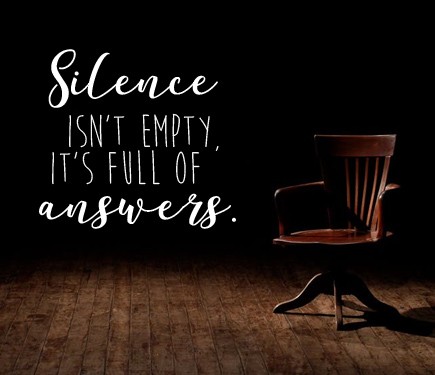
Silence is the most powerful scream.
There is a great quote from Eastern philosophy: “Silence is the most powerful scream.”
We live in a world where we are being pushed to survive in a world of noise and messages. From webinars, zoom meetings, webex, team meetings, radio, news, music, stores, and most businesses, to the rings of our phones.
What I have realized is that the more we use the online tools and the more we use nonphysical ways to communicate such as computers and phones. We are having a tendency to be perceived to be more negative in our approaches. We are more skeptical and we question more, do not know if it because when we are online we are not faced with human language and the interaction we do in silence when we see each other’s. It is much harder to see things from a brighter positive side when we are in a two-dimensional or even one dimensional when on the phone. By being remote it becomes more of an effort in way we treat each others. Once again this is my reflection and my observations.
I do not know why I observed this behavior and why I feel that there is automatically a very negative tone when doing it online or phone. Some people might say that there is a social style making this and that we are not all fully equipped with capabilities to this anti-social way of conducting work. Almost feels like there is a new way of bulling in the workplace now when we are working more remote and via web based meetings in form of loud speakers taking all the space, or just attackers that cuts in when someone talks to get the last word.
My reflection is when it comes to myself that I embrace silence much more often now than I done before when moving into a more digital way of meeting, there are some people that take much space in meetings like people that always need to have the last word and I am allowing them this space by being silent and analyzing every situation. Just because I am silent does not mean that I acknowledge or disagree with them but in many cases, it becomes useless to break the silence unless completely wrong.
Addition to this is also the people that cuts into when some of the more silent peoples finally opens up to speak. Usually they cut in with a negative or neglecting comment or even just tries to correct them as they speak, with an end result of a very negative feeling in that meeting. If this would be happening, in a face-to-face meeting, it would be a matter of respect, since we are in this anti-social way of meeting it is by-passed.
In many cases, silence becomes a solution to this and in many cases, this is a way to reduce confrontation and can be a reason why in many meetings around the world that we are missing some nice ideas and some great spread of knowledge. Just because someone is silent does not mean he does not have the knowledge.
My advice is to let people be heard, meeting organizers should foster some control in the meetings and make sure that we use our time to hear what people are saying without people abruptions. In some cases we maybe need to reduce the amount of people in the meetings so that we really get to hear all angels and all voices. We should also introduce rules of engagements in our meetings, both time wise and how we control speakers and comments.
In conclusion, we can be effective communicators by utilizing our ability to be silent. Everybody needs to practice; let people talk when they talk and focus on trying to take in what the people are talking about. There is a chance to learn something, even if it is only to learn how that person is communicating. I encourage people to think before they talk and really think if the comment they are about to say will add anything besides abruption to the conversation. There is great strength in silence. Now, we just need to keep practicing.
Go practice makes perfect and silence is golden.
Head of Business Transformation | Quema | Building scalable and secure IT infrastructures and allocating dedicated IT engineers from our team
1yErik, thanks for sharing!